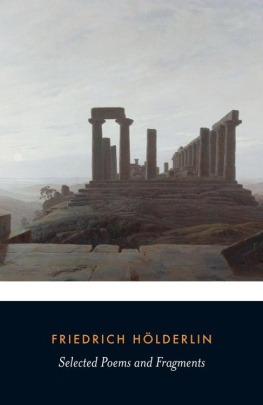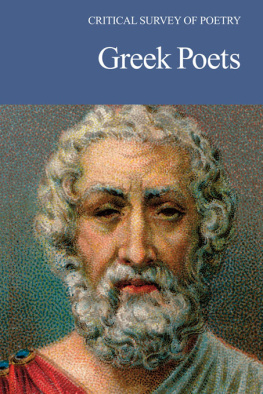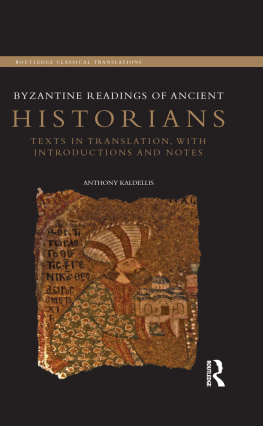Acknowledgements
I began to translate Cavafys poems one summer when for one reason or another Julie and I found ourselves in other peoples houses in the late afternoon waiting for supper. The impulse came from my dear George dAlmeida, artist, poet, and propulsive agent. Once I had started, encouraging spirits appeared along the way. An undergraduate whom I had directed to Ithaca (this would have been Rae Dalvens translation) told me later the reading had changed her life. At a neighbors wedding and at a memorial service for a beloved friend, that was the one poem family members requested. Virgil Burnett drew a Fury in ink and (as Pas de Loup Press) printed Footsteps on Bristol board and then published translation and drawing in Margins.
Poetry evenings and nights at Sylvia Moubayeds were inspiring: there Edwin Honig encouraged me to think of publication. Stuart Blazers observations were always encouraging. Faith Sandstrom caused my version of Orophernes to appear in Celator . Judith Binder has been a force for the good in most of my adventures in poetry. Sam Abrams has improved various efforts with accurate queries. Once when I read some pieces at the Providence Athenaeum, Michael Harper attended and patted me on the shoulder as he left (I try not to think he was saying, Nice try, kid).
I sent some versions to James Merrill (whom I came to know thanks to John and Edith Camp) after he had published three translations in Grand Street . I said that if he had it in mind to do the whole I would stop. He wrote back saying that he would not and that I should continue. Bob Strassler made an effort to have my versions published in England. Ernst and Annette Schmidt invited friends and colleagues to their home in Tbingen to hear me read some versions aloud. Robert and Barbara Rodgers gave me an opportunity to read and talk about Cavafy at the University of Vermont.
My colleagues in the Department of Classics at Brown University, especially William Wyatt, Adele Scafuro, and David Konstan, and now recently Elsa Amanatidou, have always been ready to read and provide informed comment. I was also given space in the Brown Classical Journal for a few versions, and Caesarion appeared in our departmental 70th birthday tribute to Michael Putnam. Ruthann Whitten has been a help at every stage. Natalia Vogeikoff-Brogan gave good, prompt advice when it was needed. Charles R. Beye brought my work to the attention of Ann Rosener, who published eleven of the poems in her In Simple Clothes , a livre dartiste , with three etchings by William Brice.
Lucia Athanassaki pushed me to try Elytis and Seferis as well, and so did Angelos Matthaiou, who, when he learned that I was translating Cavafy, presented me with an armful of relevant texts. Charis Kalliga used my translation of her poems in Minoa Akra . Becky Sinos provided me with relevant background music for a reading on the Amherst College radio, and some relevant questions as well. Diskin Clay and Dia Philippides gave me critical bibliographical help. Despina Mylonas, almost from the very start, read every single translation at least once, and improved them all. Mike Keeley, to whom I sent a whole batch, read them critically and gave me authoritative advice.
With Peter Green over the years I have learned about Cavafy and Greece both then and now. Jim Ottaway, George Huxley, Ron and Connie Stroud, and Jane Chaplin have each in one way or another given me heartening encouragement, as have Lindley, Alan, David, and Alison. Hunter Lewis, publisher of Axios Press, has instructed me in various ways, most recently by directing my attention to Cavafys values. And indeed I owe my whole exploration of modern Greece to the American School of Classical Studies at Athens, and these days especially to the Gennadius Library, and always to JEMB. A word about my approach to translating Cavafy: He composed in various modes, sometimes combining purifying, i.e., old-fashioned Greek and demotic, the language in general use today, in a single poem, sometimes using rhymes, but more often not. I have tried to approach his spare, not to say bony, style, eschewing poetic locutions, and by using fewer rather than more words to convey his meaning.
I have read and learned from other translations, chiefly those of the following: Rae Dalven, Edmund Keeley, Philip Sherrard, George Savides, Memas Kolaitis, James Merrill, Peter Green, Sam Abrams, Diskin Clay, Evangelos Sachperaglou, John Mavrogordato, Avi Sharon, Glenn Bowersock, Stratis Haviaris,, Theoharis Theoharis, Aliki Barnstone, Robert Elsie, Filippo Maria Pontani. For readers who are looking at Cavafy for the first time, I list a few favorites, both my own and those of readers generally: Ithaca, Waiting for the Barbarians, King Demetrios, The City, Footsteps, Alexandrian Kings, Ides of March, Young Men of Sidon.
Poems
Walls
Without regard, compasssion or shame, they built around me great high walls. And I sit here now and despair. No other thought: my fate eats me. Because I had so many things to do outside.
Alas, when they were building the walls how could I not pay attention? But I never heard noise from the builders, not a sound. Without my notice they closed me in from the world outside.
An Old Man
Inside a noisy kappheneion bent over his table an old man sits newspaper in front of him, no company. Among hateful aspects of a wretched old age he thinks how little he enjoyed the years he had energy, something to say, and looks. He knows hes too old: feels it, watches it and yet the time when he was young seems like yesterday, What a little time! What a little time! And he reflects how Prudence mocked him and how he always believed herhow crazy! the liar who said, Tomorrow. You have lots of time.
And he remembers impulses he held in and how much joy he sacrificed. His mindless wisdom, every lost chance teases him now. ... But from much thought and remembrance the old man grows light-headed. He goes to sleep leaning on the kappheneion table.
Achilles Horses
When they saw Patroklos dead who had been so brave and strong and young Achilles horses began to weep: their immortal nature was distressed at this work of death they saw; they shook their heads and set their long manes in motion, they struck the ground with their hooves and mourned a Patroklos recognized as lifelessdisappeared base flesh nowspirit lost defenselessbreath gone given back from life to the great Nothing.
Zeus saw the tears of the immortal horses and grieved. At Peleus wedding, he said, I should have thought better not to give you, you horses of mine, unhappy as you are. What did you look for down on the ground in wretched humanity, destiny's plaything, you whom death does not ward nor ages timely disasters rack? In their torments mortals implicated you. But their tears for that deaths pervasive disaster they poured, the two, the noble beasts.
Prayer
The sea took a sailor below.
Sarpedons Funeral
Zeus is weighted with sorrow: Patroklos killed his Sarpedon.
Sarpedons Funeral
Zeus is weighted with sorrow: Patroklos killed his Sarpedon.
And now Menoitiades and the Achaians are charging to seize and debase the body. But Zeus does not at all consent: his beloved childwhom he left, and is lostThe Law is like that at least he will honor him dead. Look, he sends Apollo down to the plain, given instructions to care for the body. The corpse of the hero, Apollo with care sorrowfully raises and takes to the river. He washes away the dust and the blood. He closes the terrible wound, not leaving any trace to show.
He pours ambrosial fragrance over Sarpedon and clothes him in radiant Olympian attire. He whitens his skin and combs with a pearl comb the black, black hair. The fair limbs he composes and puts to rest. Now hes like a young king, a charioteer, in his twenty -fifth, his twenty-sixth year, at rest after winning with his golden chariot and fastest horses in a famous competition, the prize. So when Apollo had done as ordered he called his two brothers, Sleep and Death, dispatching them to take the body to Lycia, a rich place. And down to that rich place, that Lycia, these two brothers travelled, Sleep and Death, and when they reached the door of the royal house, passed on the glorified body and returned to their other concerns and tasks.






